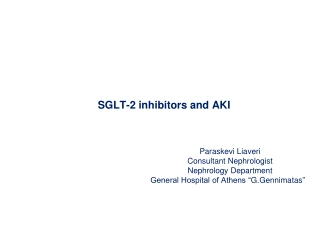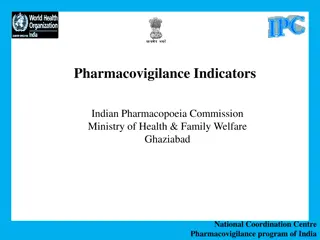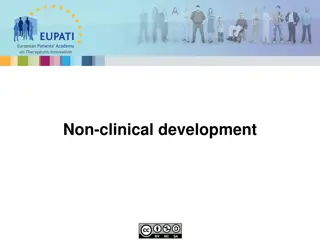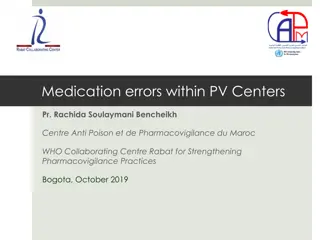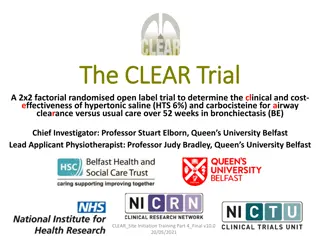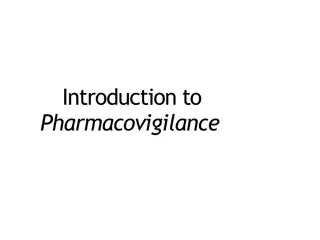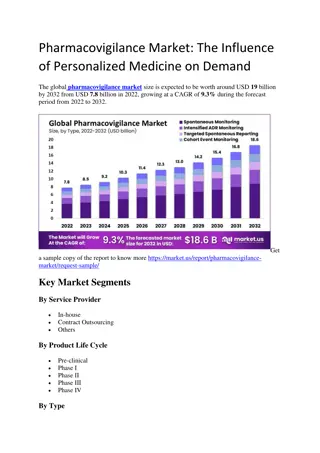Understanding Targeted Clinical Investigation in Pharmacovigilance
Targeted clinical investigation plays a crucial role in pharmacovigilance by further evaluating significant risks identified in pre-approval clinical trials. This involves conducting pharmacokinetic and pharmacodynamic studies, genetic testing, interaction studies, and large simplified trials to assess adverse drug reactions. Pharmacodynamic studies focus on how a drug affects an organism, while pharmacokinetic studies examine how an organism processes the drug. Genetic testing helps identify genetic differences and susceptibility to diseases. Interaction studies investigate potential drug-drug and food-drug interactions, assessing effects on drug actions and possible adverse effects.
Download Presentation

Please find below an Image/Link to download the presentation.
The content on the website is provided AS IS for your information and personal use only. It may not be sold, licensed, or shared on other websites without obtaining consent from the author. Download presentation by click this link. If you encounter any issues during the download, it is possible that the publisher has removed the file from their server.
E N D
Presentation Transcript
Contents Targeted clinical investigation Pharmacokinetic & PD studies Genetic testing Interaction studies Large simplified trial
Targeted clinical investigation Targeted clinical investigation is the pharmacovigilance methods. OVER-ALL PHARMACOVIGILANCE METHOD
Targeted clinical investigation When significant risks are identified from pre-approval clinical trials, further clinical studies might be called for to evaluate the mechanism of action for ADRs. This investigation includes- > PK and PD studies > Genetic testing > Interaction studies > Large simplified trial
PK and PD studies Pharmacodynamics is the study of how a drug affects an organism, whereas pharmacokinetics is the study of how the organism affect the drug. Pharmacodynamic and pharmacokinetic studies are conducted to determine whether a particular dosing instruction can put patients at an increased risk of adverse events.
Genetic Testing It is the study of a person s DNA in order to identify genetic differences or susceptibility to particular diseases or abnormalities. Several methods can be used for genetic testing: Molecular genetic tests Chromosomal genetic tests Biochemical genetic tests
Interaction studies Based on the pharmacological properties and the expected use of the drug in general practice, conducting specific studies to investigate potential drug-drug interaction and food-drug interaction might be called for Drug Drug F Food Drug Increase action of drugs Cause Adverse Effects Possible effects Possible effects Decrease action of drugs drugs Effects Decrease Action of drugs Increase action of Cause Adverse
Drug- Drug interactions Drug- drug interactions occur when a drug interacts , or interferes, with another drug. This can alter the way one or both of the drugs act in the body, or cause unexpected side effects. Aspirin + Warfarin Synergism (excessive bleeding) Antibiotic + Blood thinner Antagonism (less effect) Codeine + Paracetamol Addition (increased analgesic effect) Clavulanic acid + Amoxicillin Synergism (increased antibiotic effect) NSAID+ Cox2 inhibitors Synergism (increased bleeding) SSRI,S + VITAMIN K Synergism (increased bleeding) Anti emetics + Tranquilizers Unknown effect (Breathing problems) H2 Blockers +PPI s Alteration (increased ph of stomach) Phenobarbitol + Warfarin Antagonism (less effect) Erythromycin + Warfarin Synergism ( increased bleeding)
Drug-food interactions A drug-food interaction happens when the food you eat affects the ingredients in a medicine you are taking so the medicine cannot work the way it should. Bisphosphonates+ Any drug Reduced effectiveness of drug Benzodiazepines + grapefruit Inhibit enzyme involved in drug metabolism Digoxin + Oatmeal Decreased adsorption of drug Aspirin + Milk Upset stomach Acetaminophen + Alcohol Liver damage MOA Inhibitors + Food (tyramine) Severe headache Tetracycline + calcium food Reduced absorption of drug Warfarin + Vitamin K Reduced effect of drug Celecoxib + milk Upset stomach Naproxen + Fatty food Upset stomach Oxycodon + Alcohol Coma, asthma Caffeine + Food Rapid heart beat
Large simplified trial It is a type of randomized clinical trial ideally suited to answer many important clinical questions and because it typically answers only one or two questions in a broader patient population, is generally more efficient and less expensive than other large randomised clinical trials. It has a large sample size and statistical power to detect clinically relevant treatment effects, Providing unambiguous result and minimizing the effects of random errors.


